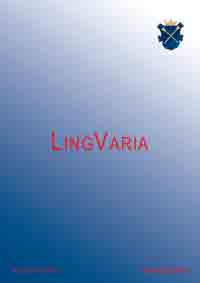Jeszcze o odróżnianiu określeń temporalnych deiktycznych od wyznaczających narracyjnie (anaforycznych)
Again on distinguishing deictic from anaphoric temporal expressions
Author(s): Renata GrzegorczykowaSubject(s): Language and Literature Studies
Published by: KSIĘGARNIA AKADEMICKA Sp. z o.o.
Keywords: semantics; time; adverbials; deixis; temporal expresions
Summary/Abstract: The paper discusses two series of temporal expressions in Polish: one that localizes the described event with regard to the act of speech (the deictic series), and one, used in narratives, that localizes it with regard to a fixed point (the so-called anaphoric series). Both series indicate simultaneity, anteriority, or posteriority of the event with regard to the act of speech (Pol. dziś ‘today’, wczoraj ‘yesterday’, tydzień temu ‘a week ago’, jutro ‘tomorrow’, za tydzień ‘in a week’, and others), or with respect to a fixed point (tego dnia ‘that day’, w przeddzień ‘a day before’, w poprzednim tygodniu ‘a week before’, nazajutrz ‘the day after’, w następnym tygodniu ‘a week later’). The two series differ in certain syntactic grammatical properties, e.g. connectivity with tense forms of the described verbs; cf. the impossible *Jutro byłem ‘I was tomorrow’, and the possible, when talking about the past, Nazajutrz byłem ‘I was a day after’. The anaphoric series, being semantically more general, can usually appear in deictic contexts; the opposite is not true, cf. the impossible *Tego dnia był w Krakowie, a jutro pojedzie do Zakopanego ‘He was in Cracow that day, and he will go to Zakopane tomorrow’.
Journal: LingVaria
- Issue Year: 2015
- Issue No: Special
- Page Range: 61-75
- Page Count: 15

